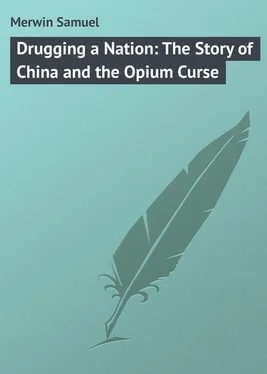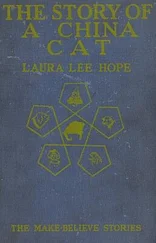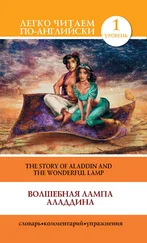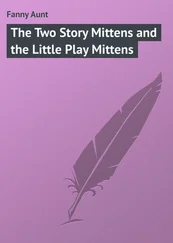Samuel Merwin - Drugging a Nation - The Story of China and the Opium Curse
Здесь есть возможность читать онлайн «Samuel Merwin - Drugging a Nation - The Story of China and the Opium Curse» — ознакомительный отрывок электронной книги совершенно бесплатно, а после прочтения отрывка купить полную версию. В некоторых случаях можно слушать аудио, скачать через торрент в формате fb2 и присутствует краткое содержание. Жанр: foreign_prose, на английском языке. Описание произведения, (предисловие) а так же отзывы посетителей доступны на портале библиотеки ЛибКат.
- Название:Drugging a Nation: The Story of China and the Opium Curse
- Автор:
- Жанр:
- Год:неизвестен
- ISBN:нет данных
- Рейтинг книги:5 / 5. Голосов: 1
-
Избранное:Добавить в избранное
- Отзывы:
-
Ваша оценка:
- 100
- 1
- 2
- 3
- 4
- 5
Drugging a Nation: The Story of China and the Opium Curse: краткое содержание, описание и аннотация
Предлагаем к чтению аннотацию, описание, краткое содержание или предисловие (зависит от того, что написал сам автор книги «Drugging a Nation: The Story of China and the Opium Curse»). Если вы не нашли необходимую информацию о книге — напишите в комментариях, мы постараемся отыскать её.
Drugging a Nation: The Story of China and the Opium Curse — читать онлайн ознакомительный отрывок
Ниже представлен текст книги, разбитый по страницам. Система сохранения места последней прочитанной страницы, позволяет с удобством читать онлайн бесплатно книгу «Drugging a Nation: The Story of China and the Opium Curse», без необходимости каждый раз заново искать на чём Вы остановились. Поставьте закладку, и сможете в любой момент перейти на страницу, на которой закончили чтение.
Интервал:
Закладка:
The notions which animated the English were equally simple. Stripped of their quaint Occidental shell of religion and respectability and theories of personal liberty, they seem to boil down to about this – that China was a great and undeveloped market and therefore the trading nations had a right to trade with her willy-nilly, and any effective attempt to stop this trade was, in some vague way, an infringement of their rights as trading nations. In maintaining this theory, it is necessary for us to forget that opium, though a “commodity,” was an admittedly vicious and contraband commodity, to be used “for purposes of foreign commerce only.”
In providing that there should be a “lasting peace” between the two nations, it was probably the idea to insure British traders against attack, or rather to provide a technical excuse for reprisals in case of such attacks. But for some reason nothing whatever was said about opium in the treaty. Now opium was more than ever the chief of the trade. England had not the slightest notion of giving it up; on the contrary, opium shipments were increased and the smuggling was developed to an extraordinary extent. How a “lasting peace” was to be maintained while opium, the cause of all the trouble, was still unrecognized by either government as a legitimate commodity, while, indeed, the Chinese, however chastened and humiliated, were still making desperate if indirect efforts to keep it out of the country and the English were making strong efforts to get it into the country, is a problem I leave to subtler minds. The upshot was, of course, that the “lasting peace” did not last. Within fifteen years there was another war. By the second treaty (that of Tientsin, 1858) Britain secured 4,000,000 taels of indemnity money (about $3,000,000), the opening of five more treaty ports, toleration for the Christian religion, and the admission of opium under a specified tariff. The Tientsin Treaty legalized Christianity and opium. China had defied the laws of trade, and had learned her lesson. It had been a costly lesson – $24,000,000 in money, thousands of lives, the fixing on the race of a soul-blighting vice, the loss of some of her best seaports, more, the loss of her independence as a nation – but she had learned it. And therefore, except for a crazy outburst now and then as the foreign grip grew tighter, she was to submit.
But China’s trouble was not over. If she was to be debauched whether or no, must she also be ruined financially? There were the indemnity payments to meet, with interest; and no way of meeting them other than to squeeze tighter a poverty-stricken nation which was growing more poverty-stricken as her silver drained steadily off to the foreigners. There was a solution to the problem – a simple one. It was to permit the growth of opium in China itself, supplant the Indian trade, keep the silver at home. But China was slow to adopt this solution. It might solve the fiscal problem; but incidentally it might wreck China. She sounded England on the subject, – once, twice. There seemed to have been some idea that England, convinced that China had her own possibility of crowding out the Indian drug, might, after all, give up the trade, stop the production in India, and make the great step unnecessary. But England could not see it in that light. China wavered, then took the great step. The restrictions on opium-growing were removed. This was probably a mistake, though opinions still differ about that. To the men who stood responsible for a solution of Chinese fiscal problem it doubtless seemed necessary. At all events, the last barrier between China and ruin was removed by the Chinese themselves. And within less than half a century after the native growth of the poppy began, the white and pink and mauve blossoms have spread across the great empire, north and south, east and west, until to-day, in blossom-time almost every part of every province has its white and mauve patches. You may see them in Manchuria, on the edge of the great desert of Gobi, within a dozen miles of Peking; you may see them from the headwaters of the mighty Yangtse to its mouth, up and down the coast for two thousand miles, on the distant borders of Thibet.
No one knows how much opium was grown in China last year. There are estimates – official, missionary, consular; and they disagree by thousands and tens of thousands of tons. But it is known that where the delicate poppy is reared, it demands and receives the best land. It thrives in the rich river-bottoms. It has crowded out grain and vegetables wherever it has spread, and has thus become a contributing factor to famines. Its product, opium, has run over China like a black wave, leaving behind it a misery, a darkness, a desolation that has struck even the Chinese, even its victims, with horror. China has passed from misery to disaster. And as if the laws of trade had chosen to turn capriciously from their inexorable business and wreak a grim joke on a prostrate race, the solution, the great step, has failed in its purpose. The trade in Indian opium has been hurt, to be sure, but not supplanted. It will never be supplanted until the British government deliberately puts it down. For the Chinese cannot raise opium which competes in quality with the Indian drug. Indian opium is in steady demand for the purpose of mixing with Chinese opium. No duties can keep it out; duties simply increase the cost to the Chinese consumer, simply ruin him a bit more rapidly. So authoritative an expert as Sir Robert Hart, director of the Chinese imperial customs, had hoped that the great step would prove effective. In “These from the Land of Sinim” he has expressed his hope:
“Your legalized opium has been a cure in every province it penetrates, and your refusal to limit or decrease the import has forced us to attempt a dangerous remedy – legalized native opium – not because we approve of it, but to compete with and drive out the foreign drug; and it is expelling it, and when we have only the native production to deal with, and thus have the business in our own hands, we hope to stop the habit in our own way.”
The great step has failed. Indian opium has not been expelled. For the Chinese to put down the native drug without stopping the import is impossible as well as useless. The Chinese seem determined, in one way or another, to put down both. Once, again, after a weary century of struggle, they have approached the British government. Once again the British government has been driven from the Scylla of healthy Anglo-Saxon moral indignation to the Charybdis behind that illuminating phrase – “India needs the money.” Twenty million dollars is a good deal of money. The balance sheet reigns; and the balance sheet is an exacting ruler, even if it has triumphed over common decency, over common morality, over common humanity.
Will you ride with me (by rickshaw) along the International Bund at Shanghai – beyond the German Club and the Hongkong Bank – over the little bridge that leads to Frenchtown – past a half mile of warehouses and chanting coolies and big yellow Hankow steamers – until we turn out on the French Bund? It is a raw, cloudy, March morning; the vendors of queer edibles who line the curbing find it warmer to keep their hands inside their quilted sleeves.
It is a lively day on the river. Admiral Brownson’s fleet of white cruisers lie at anchor in midstream. A lead-gray British cruiser swings below them, an anachronistic Chinese gunboat lower still. Big black merchantmen fill in the view – a P. and O. ship is taking on coal – a two-hundred-ton junk with red sails moves by. Nearer at hand, from the stone quay outward, the river front is crowded close with sampans and junks, rows on rows of them, each with its round little house of yellow matting, each with its swarm of brown children, each with its own pungent contribution to the all-pervasive odour. Gaze out through the forests of masts, if you please, and you will see two old hulks, roofed with what looks suspiciously like shingles, at anchor beyond. They might be ancient men-of-war, pensioned off to honourable decay. You can see the square outline of what once were portholes, boarded up now. The carved, wooden figure-heads at the prow of each are chipped and blackened with age and weather. What are they and why do they lie here in mid-channel, where commerce surges about them?
Читать дальшеИнтервал:
Закладка:
Похожие книги на «Drugging a Nation: The Story of China and the Opium Curse»
Представляем Вашему вниманию похожие книги на «Drugging a Nation: The Story of China and the Opium Curse» списком для выбора. Мы отобрали схожую по названию и смыслу литературу в надежде предоставить читателям больше вариантов отыскать новые, интересные, ещё непрочитанные произведения.
Обсуждение, отзывы о книге «Drugging a Nation: The Story of China and the Opium Curse» и просто собственные мнения читателей. Оставьте ваши комментарии, напишите, что Вы думаете о произведении, его смысле или главных героях. Укажите что конкретно понравилось, а что нет, и почему Вы так считаете.












